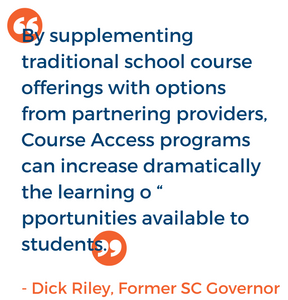South Carolina and the Technology Opportunity

Adam Crain
In fifth grade, I wrote a report on then-Secretary of State Colin Powell. I’m sure – based on the haze of selective memory – it was an A+ report. For some odd reason, the one thing I do remember is the fact that I got to save my work on a floppy disk.
For ten-year old me, using the now almost laughably antique method of saving a miniscule amount of data was an exhilarating rite of passage toward adulthood. Not only was the metal disk covering incredibly fun to play with, I was now old enough to even have something to save and transport back and forth between the computer at home and the lab at school.
Using a floppy disk signaled to me then that I was finally using technology for something other than playing computer games like Pinball and Oregon Trail – I was using it for education.
Of course, we have come a long way in the use of technology in education since my report on Colin Powell. Today, elementary school kids are more savvy with an iPad than many adults, and a failure to learn how to use technology in school is a sure way to be left behind in the twenty-first century. Even Blackboards and Dry-Erase boards have been replaced with the incredible technology associated with smart boards.
But there is still much more the Palmetto State can do.
It’s called Online Course Access and it would be a real step towards harnessing the power of technology to create equitable access to high-quality instruction for every South Carolina student.
Online Course Access would give South Carolina students the option of taking high-school classes online from a wide range of qualified public and private providers from wherever they live. Teacher of the Year in District X, technical colleges, businesses, Rosetta Stone – the sky is the limit in terms of who could provide instruction and how it could be delivered!
South Carolina has made a great start into this kind of online education transformation through a program called Virtual SC. An idea like Online Course Access can dramatically scale up this success in a quick, cost-effective way that is user friendly for students, parents and schools.
The remedy? Give student’s every opportunity to take every course that can be made available and pass state standards, public and private, and allow them to choose which classes they need and want to take. Allow technology to work for kids.
In addition to creating equitable access to high-quality instruction, Online Course Access can also help address South Carolina’s growing teacher shortage.
According to a CERRA study publicized by South Carolina’s Education Oversight Committee, by the 2021-22 school year, South Carolina will be 459 math teachers, 553 science teachers, 490 social studies teachers and 339 special education teachers short.
Online Course Access is one item that could help fill this growing gap, especially in rural areas. And in light of the inequities identified in the South Carolina Supreme Court’s Abbeville decision, harnessing this use of technology is a cost-effective, common sense first step to address inequities and make a real difference in education outcomes.
We are light years beyond the floppy disk and to build the education system of the future requires us to continually find new ways to harness technology to deliver a world class education to every student in South Carolina.
Online Course Access is the logical next step in that journey.




